Chapter 5
Getting Social with Windows
You can use Windows to manage your social schedule. You can use the People app to store contact information, connect to social networks, and keep track of friends. You can use the Calendar app to schedule meetings, appointments, and other events.
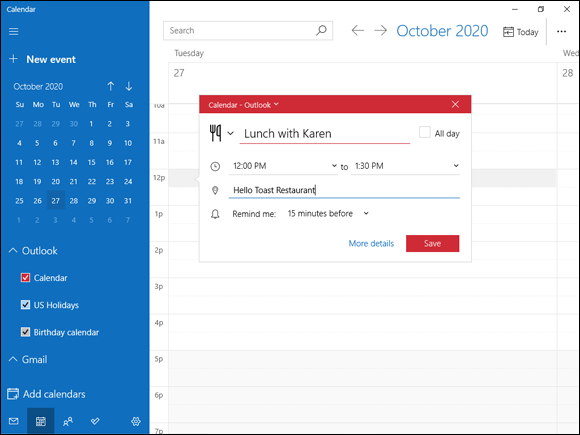
Combine Multiple Profiles for a Contact
Create a Contact
You can easily store information about your friends, family, and colleagues, as well as send messages to them, by using the People app to create a contact for each person. Each contact can store a wide variety of information, such as a person’s first and last names, company name, email address, phone number, and street address.
If you already have contacts on a social network such as Facebook or LinkedIn, you do not need to enter those contacts manually. Instead, you can connect your social network account to your Microsoft account, as described in the next few sections.
Create a Contact
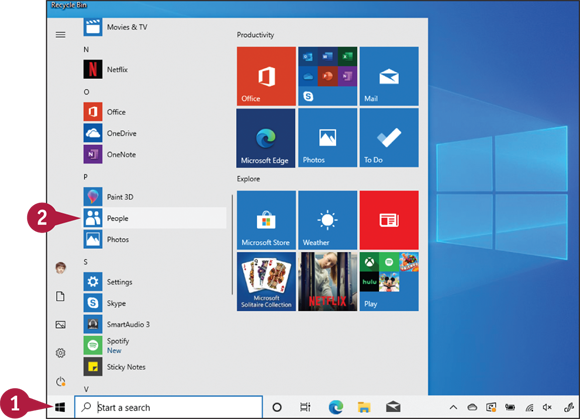
![]() Click Start (
Click Start (![]() ).
).
![]() Click People.
Click People.
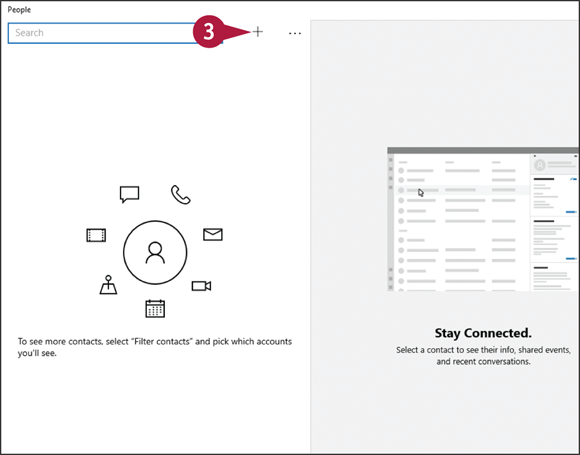
The People app loads.
Note: The first time you start the People app, click Get started, click Yes twice to give the app access to email and your calendar, and then click Ready to go.
![]() Click Add contact (
Click Add contact (![]() ).
).
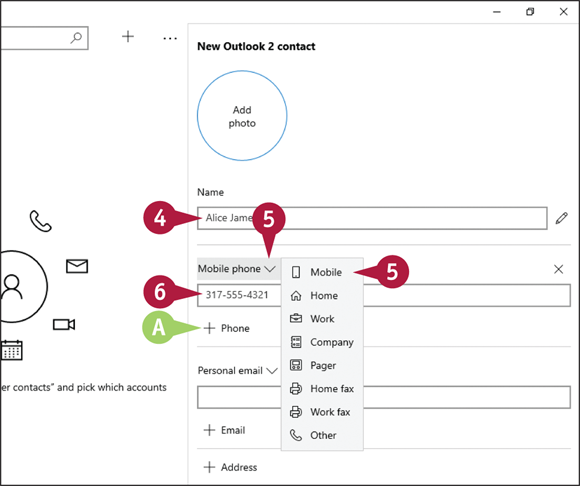
The New Contact screen appears.
![]() Type the contact’s name.
Type the contact’s name.
![]() Click the Phone
Click the Phone ![]() and then click the type of phone number that you want to enter.
and then click the type of phone number that you want to enter.
![]() Type the contact’s phone number.
Type the contact’s phone number.
![]() You can click Add (
You can click Add (![]() ) to add another phone number.
) to add another phone number.
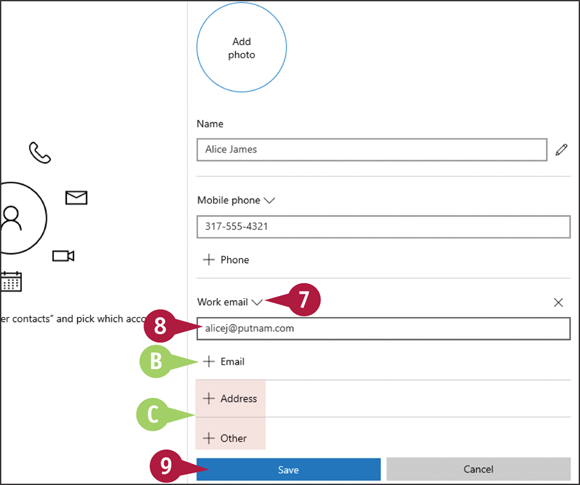
![]() Click the Email
Click the Email ![]() and then click the type of email address that you want to enter.
and then click the type of email address that you want to enter.
![]() Type the contact’s email address.
Type the contact’s email address.
![]() You can click the Email
You can click the Email ![]() to add another email address.
to add another email address.
![]() For information on how to enter an address, see the second tip in this section; for information on how to add other types of contact information, see the section “Add Extra Fields to a Contact.”
For information on how to enter an address, see the second tip in this section; for information on how to add other types of contact information, see the section “Add Extra Fields to a Contact.”
![]() Click Save.
Click Save.
The People app creates the new contact.
Add Your Google Account
You can add your Google account to Windows to access your Google contacts (as well as your Google calendar and email) from your Windows computer. To do so, you must provide Windows with your Google account login data.
After you have added your Google account, you can use the People app to view your Google contacts. You can use the Calendar app to view your Google events and appointments, and you can use the Mail app to view your Gmail messages.
Add Your Google Account
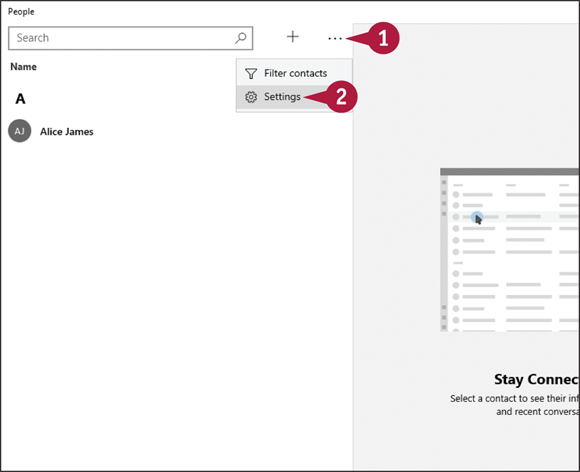
![]() In the People app, click More (
In the People app, click More (![]() ).
).
![]() Click Settings.
Click Settings.
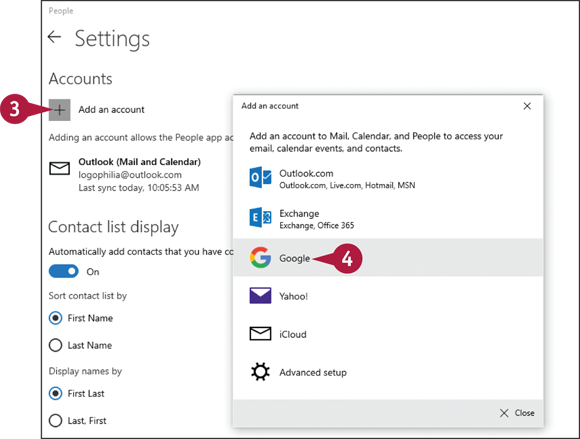
The Settings screen appears.
![]() Click Add an account.
Click Add an account.
![]() Click Google.
Click Google.
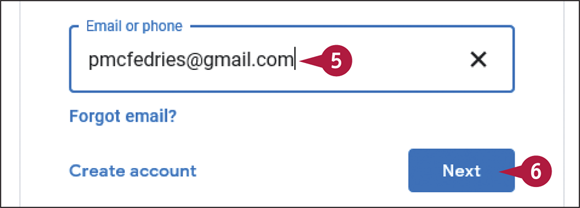
The People app prompts you for your Google login data.
![]() Type your Google email address.
Type your Google email address.
![]() Click Next.
Click Next.
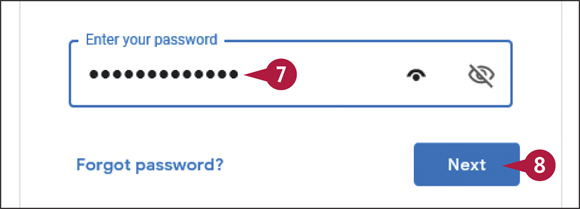
![]() Type your Google password.
Type your Google password.
![]() Click Next.
Click Next.
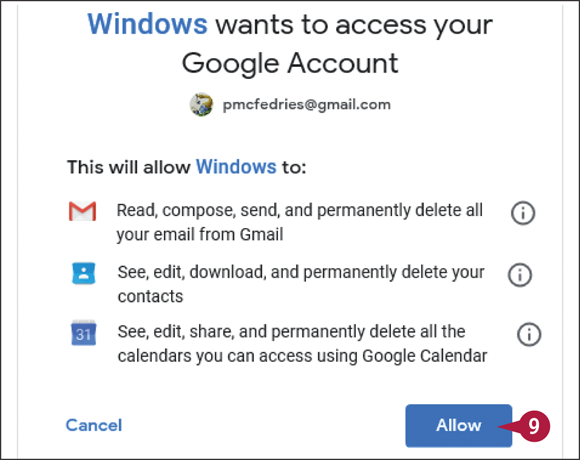
The People app shows you what it will do with your Google data.
![]() Click Allow.
Click Allow.
Windows connects your Google account to your Microsoft account.
![]() Click Done (not shown).
Click Done (not shown).
Windows syncs your Gmail contacts with the People app.
Add Your iCloud Account
You can add your iCloud account to Windows to access your iCloud contacts (as well as your iCloud calendar and email) from your Windows computer. To do so, you must provide Windows with your iCloud account login data.
After you have added your iCloud account, you can use the People app to view your iCloud contacts. You can use the Calendar app to view your iCloud events and appointments, and you can use the Mail app to view your iCloud messages.
Add Your iCloud Account
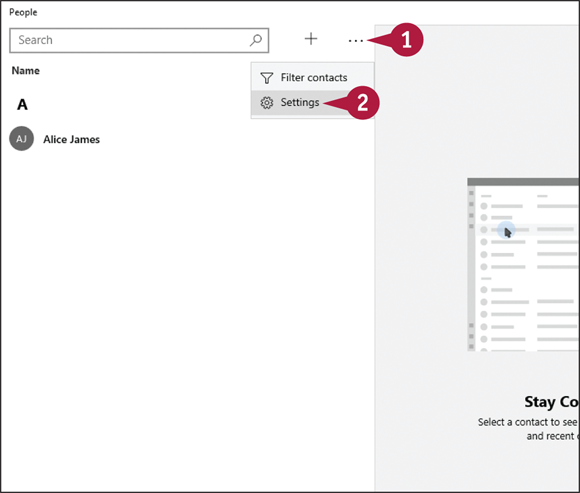
![]() In the People app, click More (
In the People app, click More (![]() ).
).
![]() Click Settings.
Click Settings.
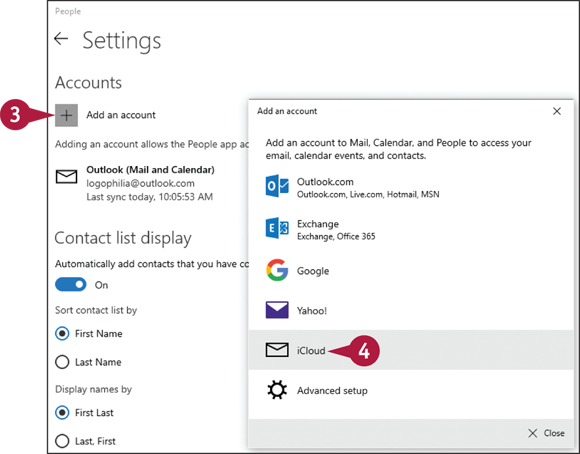
The Settings screen appears.
![]() Click Add an account.
Click Add an account.
![]() Click iCloud.
Click iCloud.
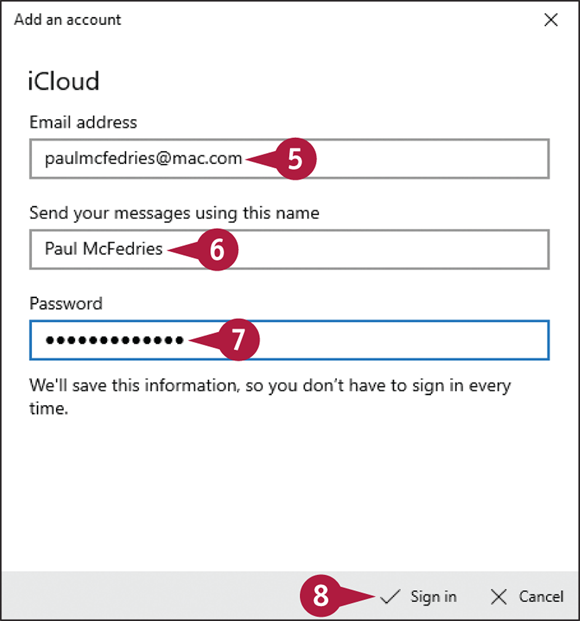
The People app prompts you for your iCloud login data.
![]() Type your iCloud email address.
Type your iCloud email address.
![]() Type the name you want to use with the iCloud account.
Type the name you want to use with the iCloud account.
![]() Type your iCloud password.
Type your iCloud password.
![]() Click Sign in.
Click Sign in.
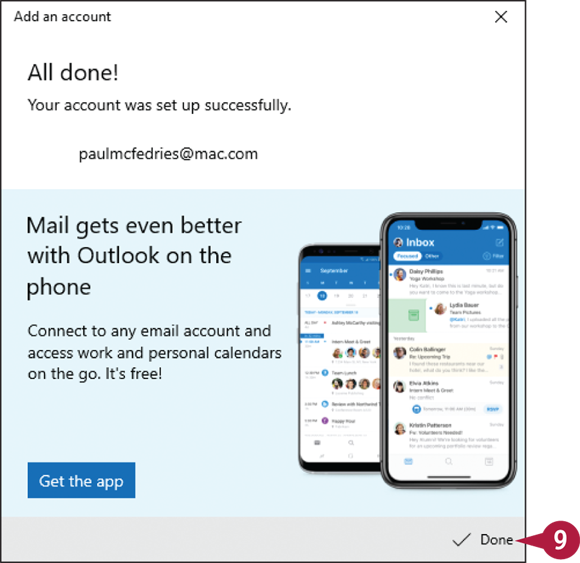
Windows connects your iCloud account to your Microsoft account.
![]() Click Done.
Click Done.
Windows syncs your iCloud contacts with the People app.
View a Contact
After you have added contacts and connected your other accounts to Windows, you can use the People app to view your contacts. The information that you see when you view a contact depends on how the contact was added to Windows. If you added the contact yourself, you see the information that you entered. If the contact was added by connecting another account to Windows, you see the data provided by that account. If you have many contacts, you can also use the People app’s Search feature to locate the contact you want to view.
View a Contact
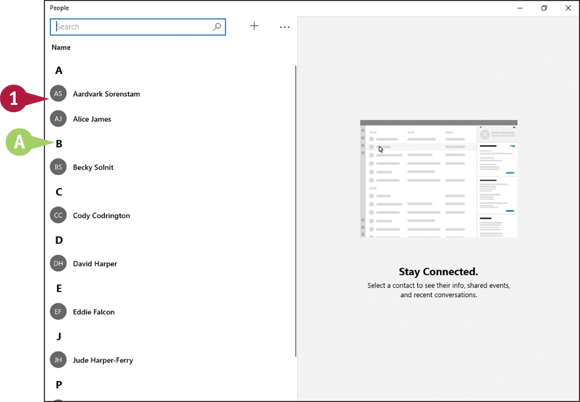
View a Contact
![]() In the People app, scroll the Contacts list up or down to locate the contact you want to view.
In the People app, scroll the Contacts list up or down to locate the contact you want to view.
![]() You can also click any of the letters that divide the Contacts list alphabetically. In the grid of letters that appears, click the letter you want to view.
You can also click any of the letters that divide the Contacts list alphabetically. In the grid of letters that appears, click the letter you want to view.
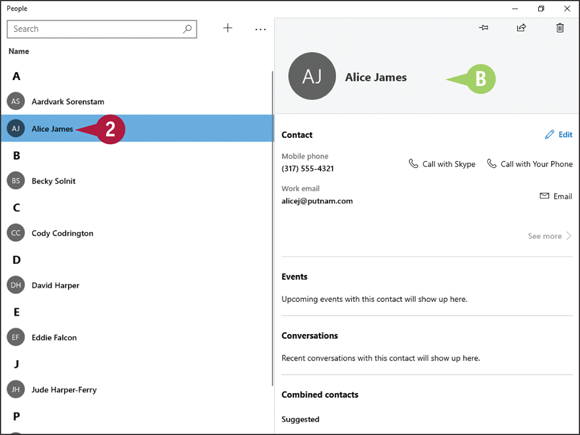
![]() Click the contact.
Click the contact.
![]() The People app displays the contact’s data.
The People app displays the contact’s data.
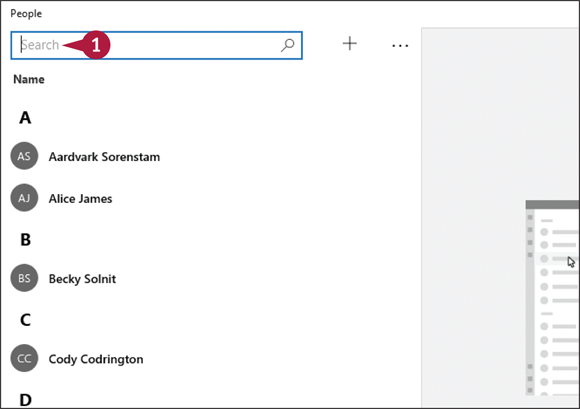
Search for a Contact
![]() Click in the People app’s Search box.
Click in the People app’s Search box.
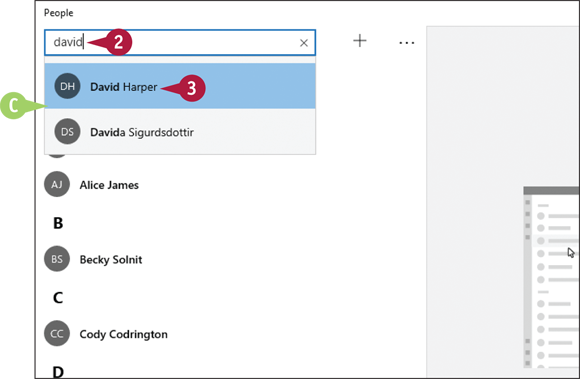
![]() Begin typing the name of the contact you want to view.
Begin typing the name of the contact you want to view.
![]() People displays a list of contacts with names that match your typing.
People displays a list of contacts with names that match your typing.
![]() When you see the contact you want to view, click the name in the search results.
When you see the contact you want to view, click the name in the search results.
The People app displays the contact’s data.
Edit a Contact
If you need to make changes to the information already in a contact, or if you need to add new information to a contact, you can edit the contact from within the People app. While editing a contact, you can modify the existing information, add new information to the contact, or delete existing information.
Edit a Contact
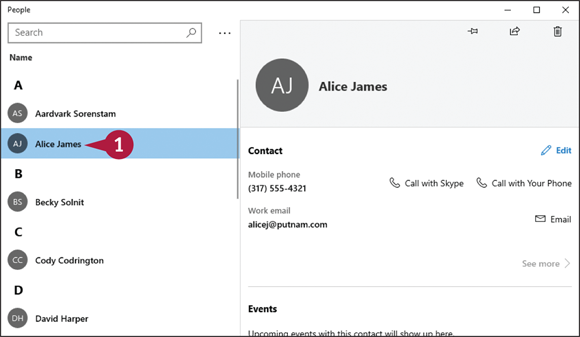
![]() In the People app, click the contact you want to edit.
In the People app, click the contact you want to edit.

![]() Click Edit.
Click Edit.
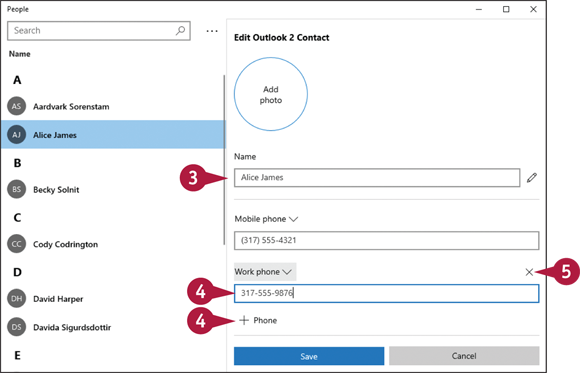
People makes the contact’s fields available for editing.
![]() Edit the existing fields as required.
Edit the existing fields as required.
![]() To add a field, click the
To add a field, click the ![]() beside the field type you want to use and then type the data.
beside the field type you want to use and then type the data.
![]() To remove a field, position the mouse pointer (
To remove a field, position the mouse pointer (![]() ) over the field and then click Remove (
) over the field and then click Remove (![]() ).
).
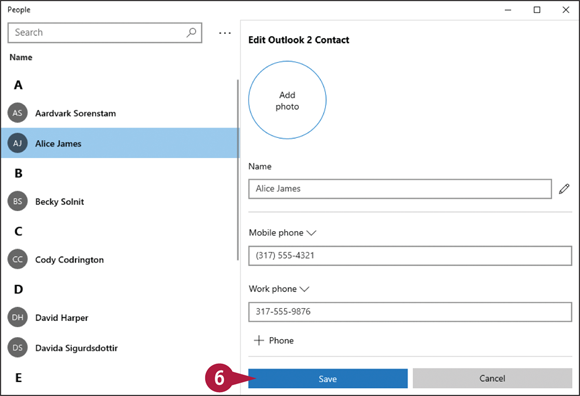
![]() When you complete your edits, click Save.
When you complete your edits, click Save.
People saves the edited contact.
Assign a Photo to a Contact
You can add visual interest to the People app and make it more useful by assigning photos to your contacts. By default, the People app shows just the contact’s initials as the image for each contact. If you have a photo of a contact, you can assign that photo as a replacement for the default image. Assigning photos not only improves the look of the People app, but it also helps you remember your contacts, particularly if they are business colleagues or similar acquaintances that you do not see very often.
Assign a Photo to a Contact
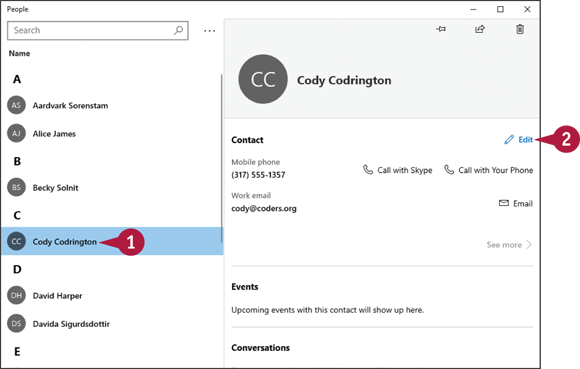
![]() In the People app, click the contact you want to work with.
In the People app, click the contact you want to work with.
![]() Click Edit.
Click Edit.
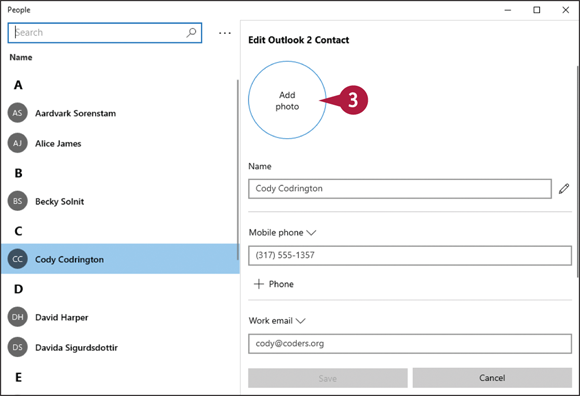
People opens the contact for editing.
![]() Click Add photo.
Click Add photo.
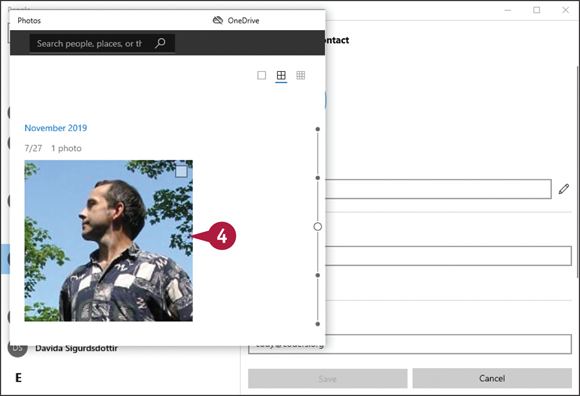
A version of the Photos app displays your photos.
![]() Click the photo you want to add.
Click the photo you want to add.
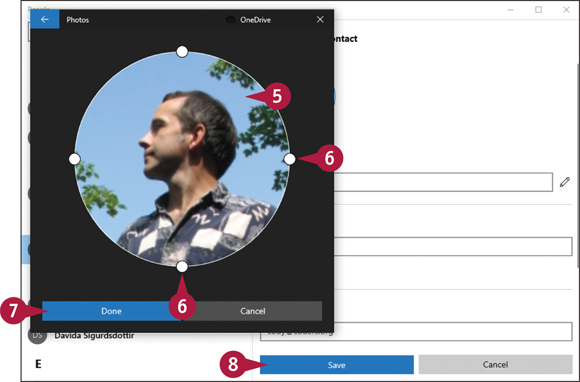
People prompts you to choose the area of the photo that you want to use for the contact.
![]() Click and drag the photo to set the area you want to use within the circle.
Click and drag the photo to set the area you want to use within the circle.
![]() Click and drag any of the four handles to set the size of the circle.
Click and drag any of the four handles to set the size of the circle.
![]() Click Done.
Click Done.
People adds the photo to the contact.
![]() Click Save.
Click Save.
People saves the edited contact.
Add Extra Fields to a Contact
The People app offers several other fields that you can add to a contact to store more data about that person or company. The default editing screen shows only a few field types: Name, Phone, Email, and Address. However, People also supports many other field types that enable you to store data such as the contact’s website address, company name, job title, and office location. You can also save personal data such as the name of the contact’s significant other and the contact’s birthday and anniversary. Finally, you can also add a Notes field to hold any other required data.
Add Extra Fields to a Contact
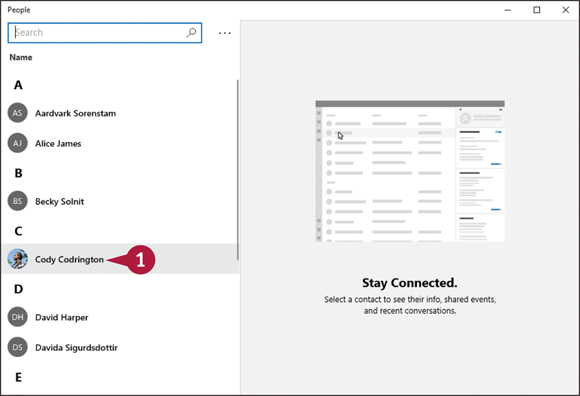
![]() In the People app, click the contact you want to edit.
In the People app, click the contact you want to edit.
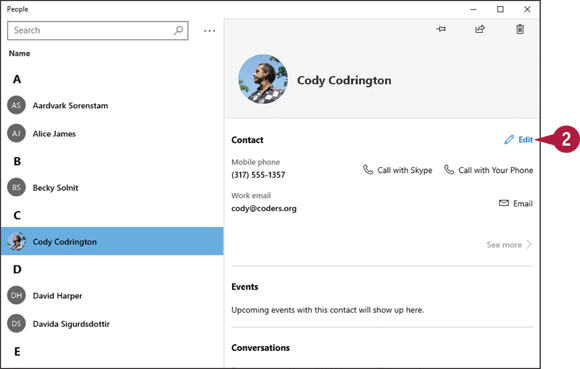
![]() Click Edit.
Click Edit.

People makes the contact’s fields available for editing.
![]() Click the Other
Click the Other ![]() .
.
![]() Click the type of field you want to add.
Click the type of field you want to add.
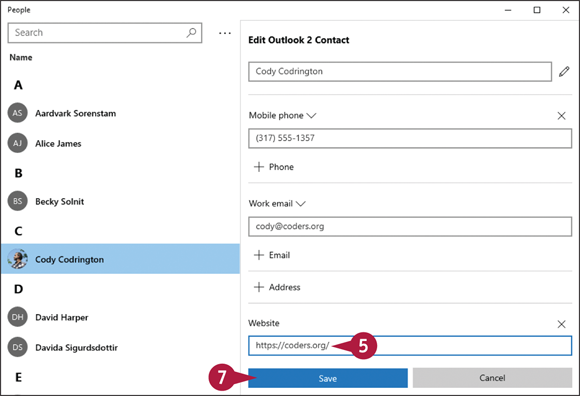
![]() Fill in the data for the new field.
Fill in the data for the new field.
![]() Repeat steps 3 to 5 to add extra fields as needed.
Repeat steps 3 to 5 to add extra fields as needed.
![]() When you complete your edits, click Save.
When you complete your edits, click Save.
People saves the edited contact.
Filter the Contacts List
You can make a long Contacts list easier to navigate and manage by filtering it to hide certain contacts. For example, if you mostly use People to locate contacts for phone calling or text messaging, you can filter the Contacts list to hide all those contacts who do not have a phone number. Similarly, if you have multiple accounts added to the People app, you might find that this creates many duplicate entries. You can fix this problem by filtering the Contacts list to hide all contacts from a particular account.
Filter the Contacts List
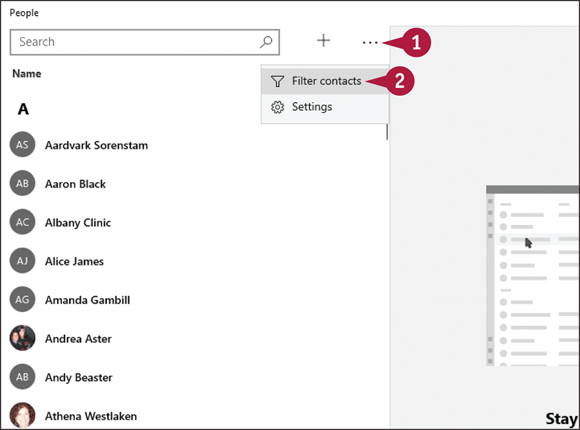
Hide Contacts Without Phone Numbers
![]() In the People app, click More (
In the People app, click More (![]() ).
).
![]() Click Filter contacts.
Click Filter contacts.
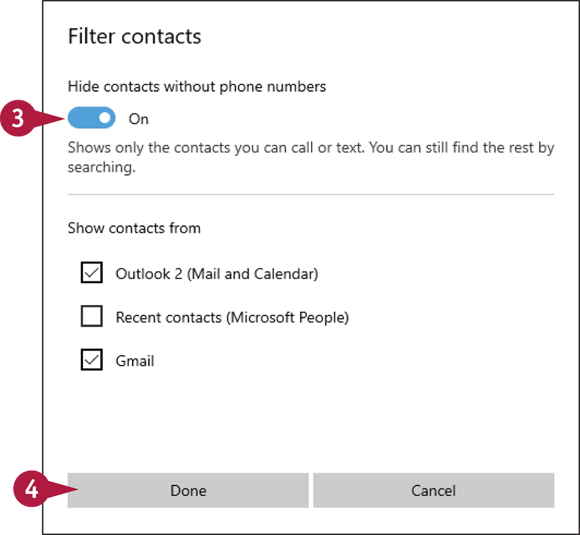
The Filter Contacts dialog box appears.
![]() Click the Hide contacts without phone numbers switch to On.
Click the Hide contacts without phone numbers switch to On.
![]() Click Done.
Click Done.
People only shows those contacts who have at least one phone number.
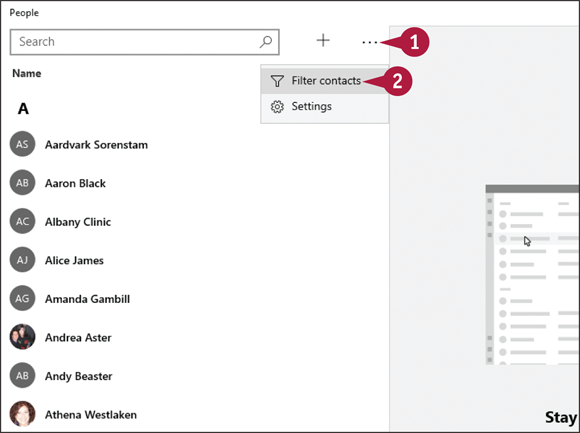
Hide Contacts by Account
![]() In the People app, click More (
In the People app, click More (![]() ).
).
![]() Click Filter contacts.
Click Filter contacts.
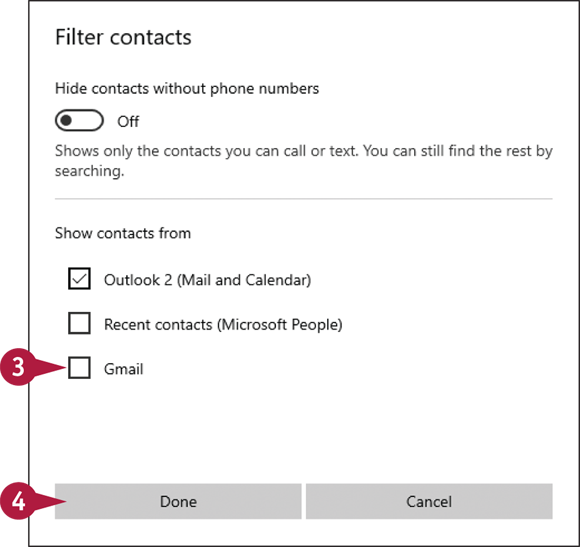
The Filter Contacts dialog box appears.
![]() Click the account you want to hide (
Click the account you want to hide (![]() changes to
changes to ![]() ).
).
![]() Click Done.
Click Done.
People hides the contacts from the account you deselected in step 3.
Combine Multiple Profiles for a Contact
You can make your Contacts list more manageable and more useful by combining two or more contacts that are profiles of the same person. When you add multiple accounts to People, you might end up with the same contact listed two or more times. If those profiles contain different data — for example, one might contain personal information, whereas the other contains work information — you should combine them into a single profile for easier access. In many cases, People will suggest a contact to combine, but you can also search for a contact to combine.
Combine Multiple Profiles for a Contact
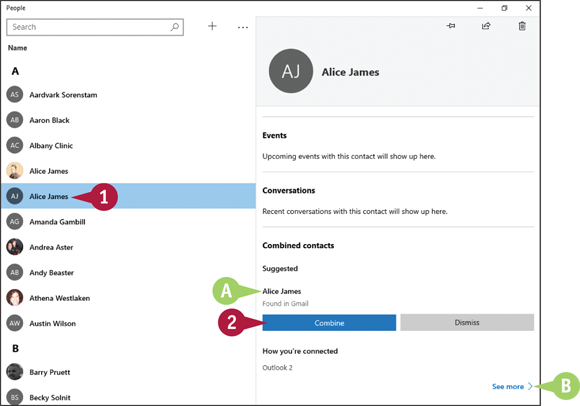
Combine a Suggested Contact
![]() In the People app, click one of the profiles that you want to link.
In the People app, click one of the profiles that you want to link.
![]() If the People app has found a similar contact, you see that contact’s name in the Suggested section.
If the People app has found a similar contact, you see that contact’s name in the Suggested section.
![]() Click Combine.
Click Combine.

![]() If the suggested contact is incorrect, you can click See more and continue with the steps in the next subsection, “Locate and Combine a Contact.”
If the suggested contact is incorrect, you can click See more and continue with the steps in the next subsection, “Locate and Combine a Contact.”
People asks you to confirm that you want to combine the contacts.
![]() Click Combine.
Click Combine.
People combines the contacts into a single profile.
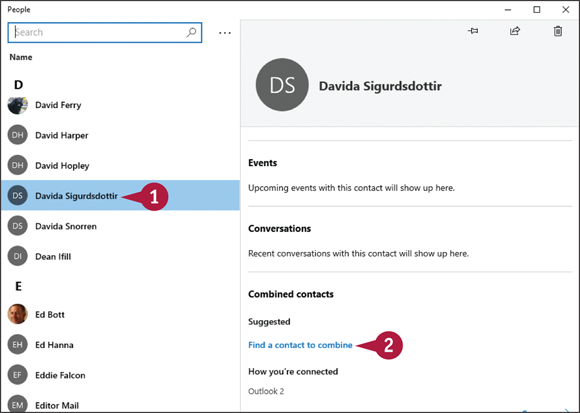
Locate and Combine a Contact
![]() In the People app, click one of the profiles that you want to link.
In the People app, click one of the profiles that you want to link.
![]() Click Find a contact to combine.
Click Find a contact to combine.
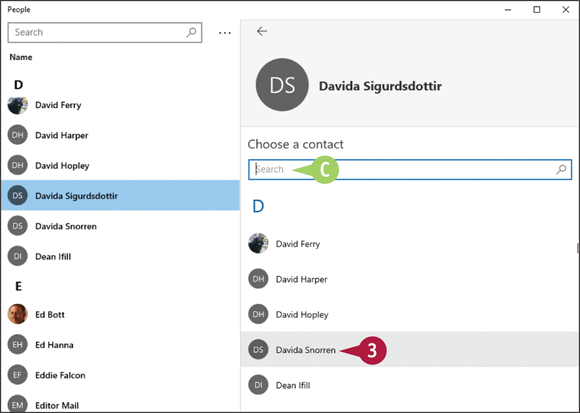
The Choose a Contact pane appears.
![]() If your Contacts list is long, you can use the Search box to locate the contact.
If your Contacts list is long, you can use the Search box to locate the contact.
![]() Click the contact you want to link.
Click the contact you want to link.
People combines the contacts into a single profile.
View Your Calendar
Windows comes with a Calendar app to enable you to manage your schedule. To create an event such as an appointment or meeting, or an all-day event such as a conference or trip, you select the date when the event occurs.
Calendar lets you change the calendar view to suit your needs. For example, you can show just a single day’s worth of events if you want to concentrate on that day’s activities. Similarly, you can view a week’s or a month’s worth of events if you want to get a larger sense of what your overall schedule looks like.
View Your Calendar
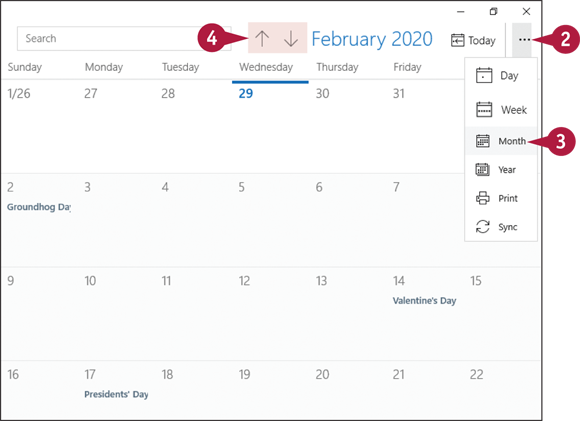
View Events by Month
![]() In the Start menu, click Calendar (not shown).
In the Start menu, click Calendar (not shown).
Note: When you first start Calendar, if Windows asks if the app can use your location, click No.
![]() Click More (
Click More (![]() ).
).
![]() Click Month.
Click Month.
Your calendar for the month appears.
![]() Click
Click ![]() and
and ![]() to navigate the months.
to navigate the months.
Note: On a touchscreen PC, you navigate the months by swiping up and down on the screen.
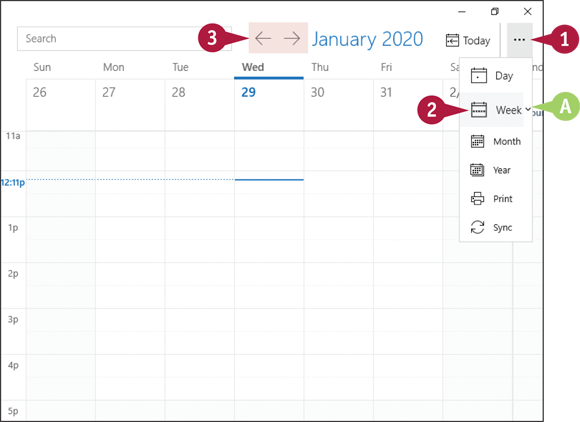
View Events by Week
![]() Click More (
Click More (![]() ).
).
![]() Click Week.
Click Week.
![]() To see just Monday through Friday, you can click the Week
To see just Monday through Friday, you can click the Week ![]() and then click Work week instead.
and then click Work week instead.
Your events for the week appear.
![]() Click
Click ![]() and
and ![]() to navigate the weeks.
to navigate the weeks.
Note: On a touchscreen PC, you navigate the weeks by swiping left and right on the screen.
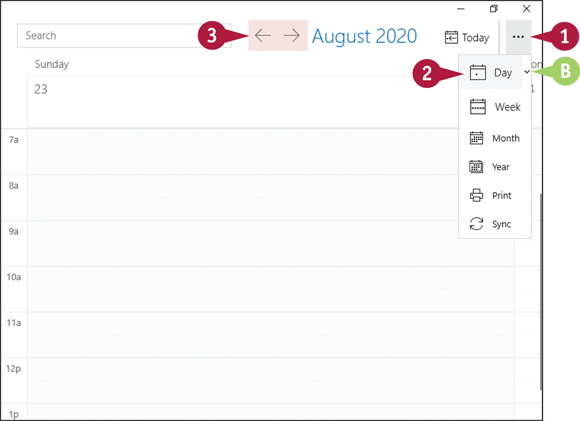
View Events by Day
![]() Click More (
Click More (![]() ).
).
![]() Click Day.
Click Day.
The events for a single day appear.
![]() To specify the number of days you want to view, you can click the Day
To specify the number of days you want to view, you can click the Day ![]() and then click the view you want, such as 2 day to see two days at a time.
and then click the view you want, such as 2 day to see two days at a time.
![]() Click
Click ![]() and
and ![]() to navigate the days.
to navigate the days.
Note: On a touchscreen PC, you navigate the days by swiping left and right on the screen.
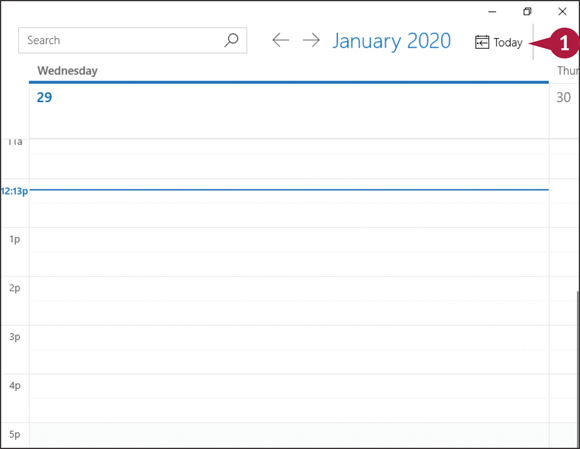
View Today’s Events
![]() Click Today.
Click Today.
Calendar navigates the current view to show today’s date.
Add an Event to Your Calendar
You can help organize your life by using the Calendar app to record your upcoming events — such as appointments, meetings, phone calls, and dates — on the date and time that they are scheduled to occur.
If the event has a set time and duration — for example, a meeting or a lunch date — you add the event directly to the calendar as a regular appointment. If the event has no set time — for example, a birthday, anniversary, or multiple-day event such as a sales meeting or vacation — you can create an all-day event.
Add an Event to Your Calendar
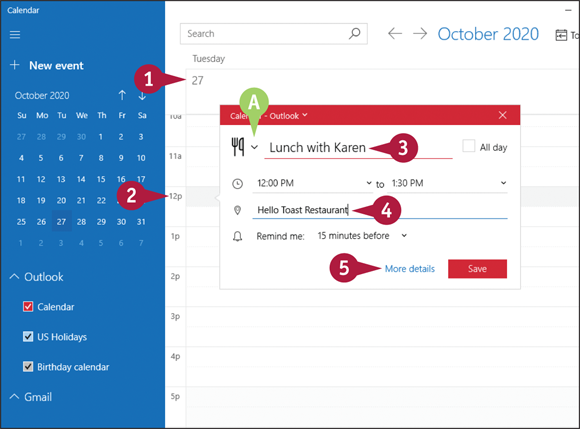
![]() In the Calendar app, navigate to the date when the event occurs.
In the Calendar app, navigate to the date when the event occurs.
![]() Click the time when the event starts.
Click the time when the event starts.
Note: If you are currently in Month view, click the day the event occurs.
![]() Type a name for the event.
Type a name for the event.
![]() Click this
Click this ![]() and then click an icon that represents the event.
and then click an icon that represents the event.
![]() Type the event location.
Type the event location.
![]() Click More details.
Click More details.
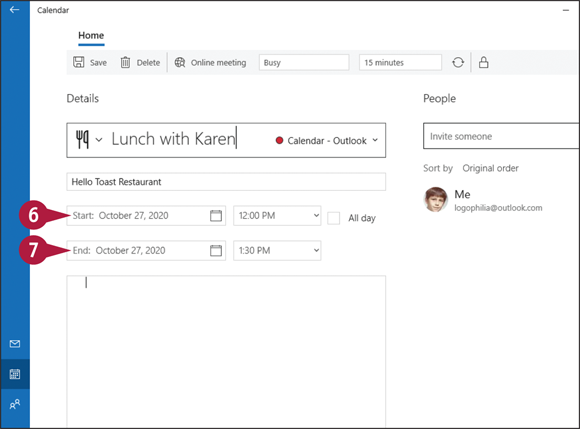
Calendar displays the event details screen.
![]() If the start date and/or time is incorrect, use the Start controls to select the correct start time.
If the start date and/or time is incorrect, use the Start controls to select the correct start time.
![]() If the end date and/or time is incorrect, use the End controls to select the correct end time.
If the end date and/or time is incorrect, use the End controls to select the correct end time.
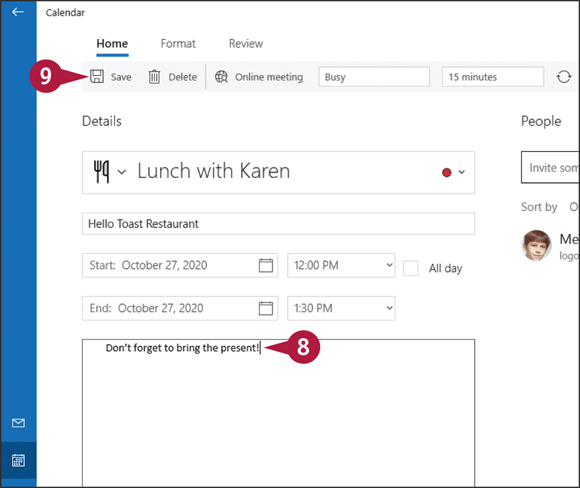
![]() Use the large text area to type notes related to the event.
Use the large text area to type notes related to the event.
![]() Click Save.
Click Save.
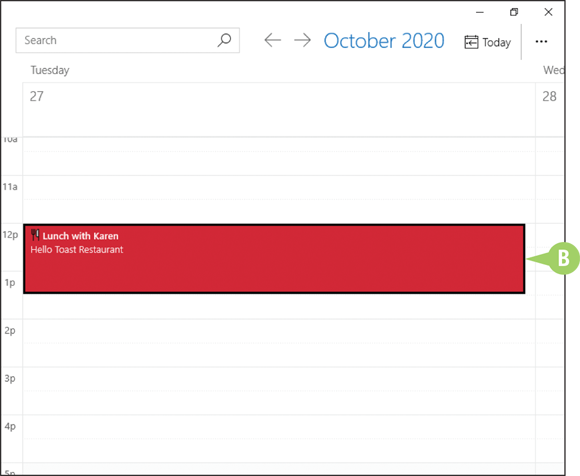
![]() Calendar adds the event to your schedule.
Calendar adds the event to your schedule.
To make changes to the event, you can click it.
Create a Recurring Event
If you have an activity or event that recurs at a regular interval, you can create an event and configure it to automatically repeat in the Calendar app. This saves you from having to repeatedly add the future events manually because Calendar adds them for you automatically.
You can repeat an event daily, weekly, monthly, or yearly. If your activity recurs every day only during the workweek, such as a staff meeting, you can also set up the event to repeat every weekday.
Create a Recurring Event
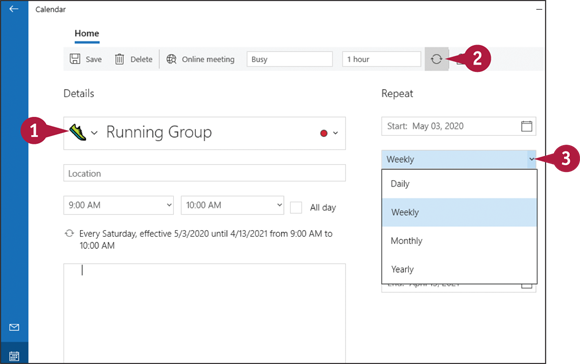
![]() Follow the steps in the previous section, “Add an Event to Your Calendar,” to create an event and then click the event.
Follow the steps in the previous section, “Add an Event to Your Calendar,” to create an event and then click the event.
Calendar displays the event details.
![]() Click Repeat (
Click Repeat (![]() ).
).
![]() Click
Click ![]() and then click the repeat interval that you want to use.
and then click the repeat interval that you want to use.
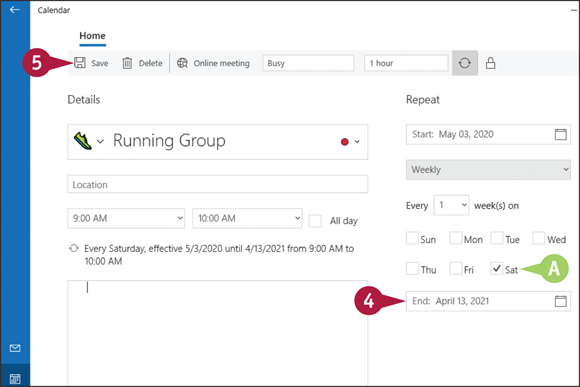
![]() You might also be able to further refine your choice, such as choosing the specific day of the week for the Weekly interval.
You might also be able to further refine your choice, such as choosing the specific day of the week for the Weekly interval.
![]() If needed, use the End calendar control to select the last recurrence.
If needed, use the End calendar control to select the last recurrence.
![]() Click Save.
Click Save.
Calendar adds the future events using the interval that you specified.
Note: To edit a recurring event, click any occurrence to open that event. You can edit just that occurrence or click Edit series to edit every occurrence.
Add an Event Reminder
You can help make sure that you never miss a meeting, appointment, or other event by setting up the Calendar app to remind you before the event occurs. A reminder is a notification message that Windows displays at a specified time before the event occurs. By default, Calendar adds a 15-minute reminder to each event, but you can change that to a more suitable interval.
Add an Event Reminder
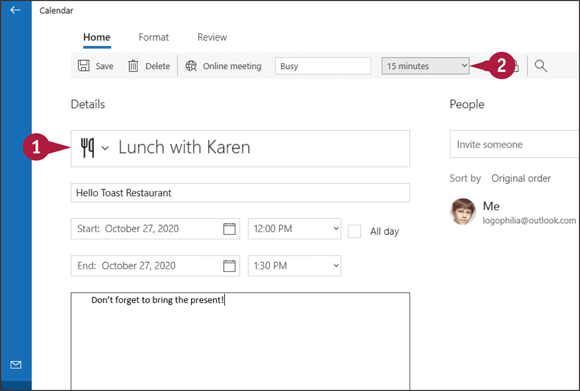
![]() Follow the steps in the section “Add an Event to Your Calendar,” earlier in this chapter, to create an event and then click the event.
Follow the steps in the section “Add an Event to Your Calendar,” earlier in this chapter, to create an event and then click the event.
Calendar displays the event details.
![]() Click the Reminder
Click the Reminder ![]() .
.
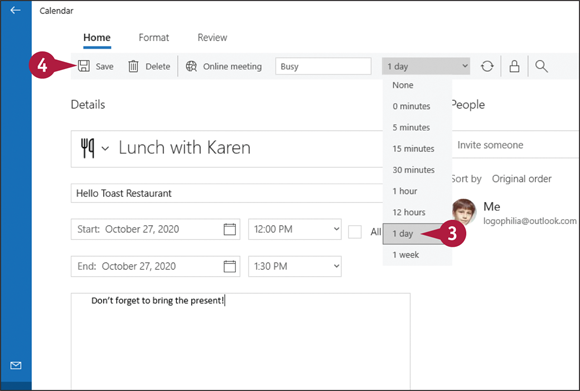
![]() Click the length of time before the event that you want the reminder to appear.
Click the length of time before the event that you want the reminder to appear.
![]() Click Save.
Click Save.
Calendar saves the event and later reminds you of it beforehand, according to the time that you select.
Send or Respond to an Event Invitation
The Calendar app has a feature that enables you to include people from your Contacts list in your event by sending them invitations to attend. If you receive an event invitation, you can respond to it to let the person organizing the event know whether you will be attending.
The advantage of this approach is that when other people respond to the invitation, Calendar automatically updates the event. When you receive an event invitation, the email message contains buttons that enable you to respond quickly.
Send or Respond to an Event Invitation
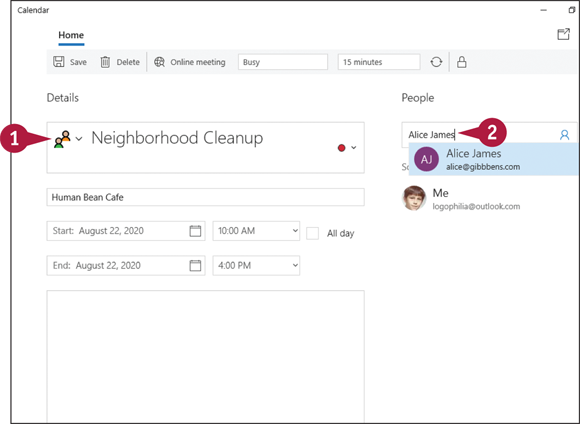
Send an Event Invitation
![]() Follow the steps in the section “Add an Event to Your Calendar,” earlier in this chapter, to create an event.
Follow the steps in the section “Add an Event to Your Calendar,” earlier in this chapter, to create an event.
![]() In the People list, specify a person whom you want to invite:
In the People list, specify a person whom you want to invite:
If the person is in your Contacts list, type the person’s name.
If the person is not in your Contacts, type the person’s email address.
![]() Press
Press ![]() .
.
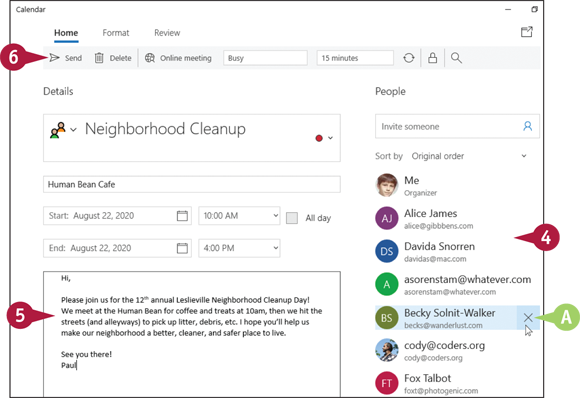
![]() Repeat steps 2 and 3 for each person you want to invite.
Repeat steps 2 and 3 for each person you want to invite.
![]() To remove a person from the invitation, you can move the mouse pointer (
To remove a person from the invitation, you can move the mouse pointer (![]() ) over the person and then click Remove (
) over the person and then click Remove (![]() ).
).
![]() Type a note that will appear with the invitation.
Type a note that will appear with the invitation.
![]() Click Send.
Click Send.
Calendar saves the event and sends the invitation.
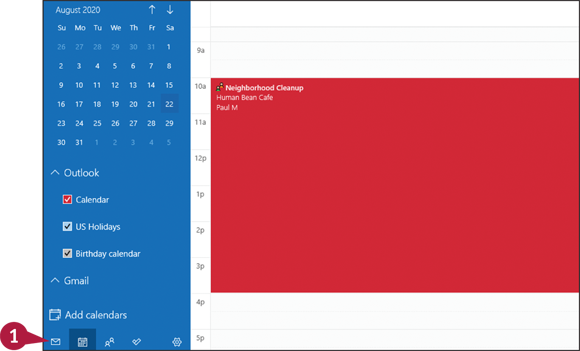
Handle an Event Invitation
![]() Click Mail (
Click Mail (![]() ).
).
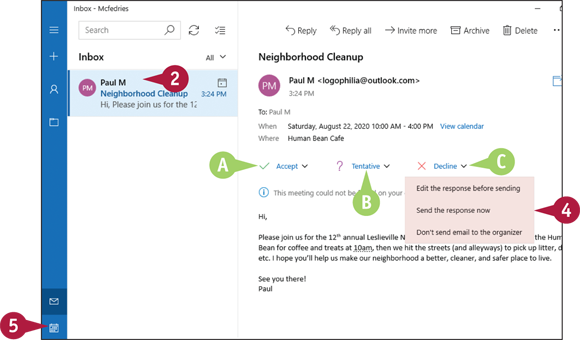
Windows switches you to the Mail app.
![]() Click the invitation.
Click the invitation.
![]() Click the button that represents your reply:
Click the button that represents your reply:
![]() You can click Accept if you can attend the event.
You can click Accept if you can attend the event.
![]() You can click Tentative if you are currently not sure whether you can attend.
You can click Tentative if you are currently not sure whether you can attend.
![]() You can click Decline if you cannot attend the event.
You can click Decline if you cannot attend the event.
![]() If you clicked either Tentative or Decline, choose whether you want to edit your response, send the response right away, or not send a response.
If you clicked either Tentative or Decline, choose whether you want to edit your response, send the response right away, or not send a response.
![]() Click Calendar (
Click Calendar (![]() ) to return to the Calendar app.
) to return to the Calendar app.
Customize Your Calendar
Calendar is a useful tool right out of the box, but it comes with a decent collection of customization settings that you can use to make the app even better. For example, you can specify a first day of the week other than Sunday. You can also specify which days are in your workweek and which hours are in your workday. You can also display week numbers and change the Calendar colors.
Customize Your Calendar
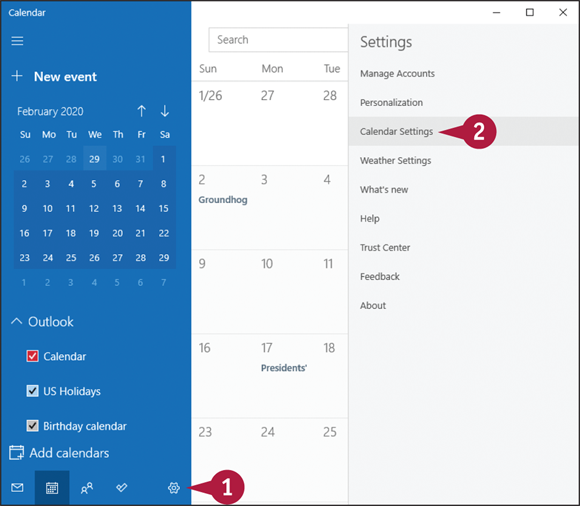
![]() Click Settings (
Click Settings (![]() ).
).
![]() Click Calendar Settings.
Click Calendar Settings.
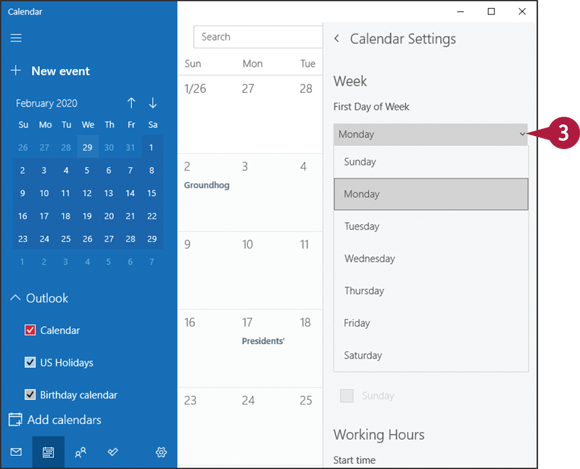
The Calendar Settings pane appears.
![]() Click the First Day of Week
Click the First Day of Week ![]() and then click the day you prefer to use as the first of the week.
and then click the day you prefer to use as the first of the week.
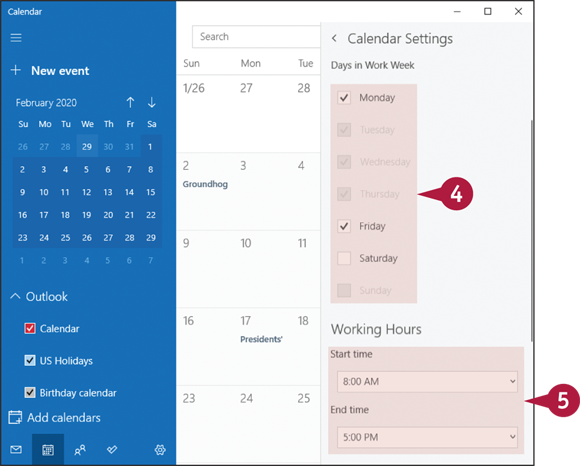
![]() Use the Days in Work Week check boxes to define your workweek.
Use the Days in Work Week check boxes to define your workweek.
![]() Click the Start time
Click the Start time ![]() and then click the End time
and then click the End time ![]() to define the beginning and end of your workday.
to define the beginning and end of your workday.
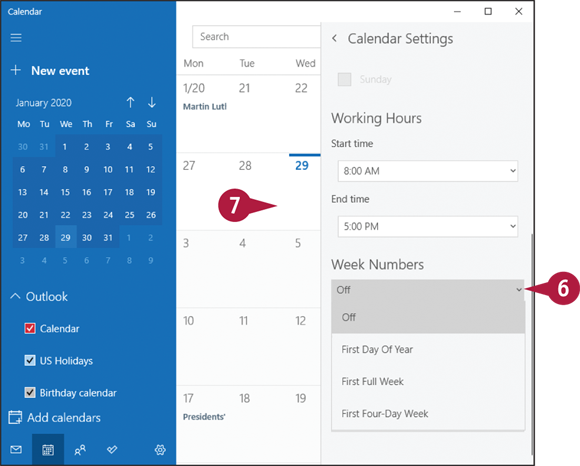
![]() If you want to display week numbers in the calendar, click the Week Numbers
If you want to display week numbers in the calendar, click the Week Numbers ![]() and then click an option (see the tip for an explanation).
and then click an option (see the tip for an explanation).
![]() Click outside the Calendar Settings pane to close the pane.
Click outside the Calendar Settings pane to close the pane.
Calendar puts the new settings into effect.
